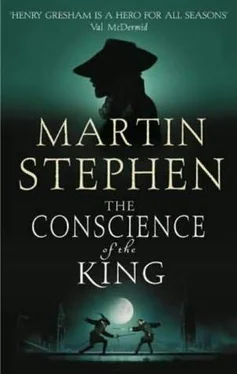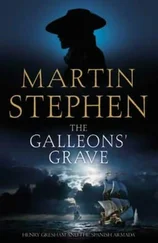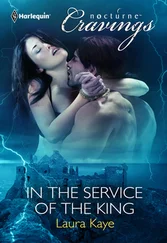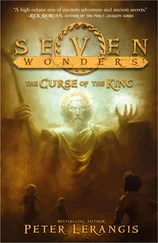Martin Stephen - The Conscience of the King
Здесь есть возможность читать онлайн «Martin Stephen - The Conscience of the King» весь текст электронной книги совершенно бесплатно (целиком полную версию без сокращений). В некоторых случаях можно слушать аудио, скачать через торрент в формате fb2 и присутствует краткое содержание. Жанр: Исторический детектив, на английском языке. Описание произведения, (предисловие) а так же отзывы посетителей доступны на портале библиотеки ЛибКат.
- Название:The Conscience of the King
- Автор:
- Жанр:
- Год:неизвестен
- ISBN:нет данных
- Рейтинг книги:4 / 5. Голосов: 1
-
Избранное:Добавить в избранное
- Отзывы:
-
Ваша оценка:
- 80
- 1
- 2
- 3
- 4
- 5
The Conscience of the King: краткое содержание, описание и аннотация
Предлагаем к чтению аннотацию, описание, краткое содержание или предисловие (зависит от того, что написал сам автор книги «The Conscience of the King»). Если вы не нашли необходимую информацию о книге — напишите в комментариях, мы постараемся отыскать её.
The Conscience of the King — читать онлайн бесплатно полную книгу (весь текст) целиком
Ниже представлен текст книги, разбитый по страницам. Система сохранения места последней прочитанной страницы, позволяет с удобством читать онлайн бесплатно книгу «The Conscience of the King», без необходимости каждый раз заново искать на чём Вы остановились. Поставьте закладку, и сможете в любой момент перейти на страницу, на которой закончили чтение.
Интервал:
Закладка:
Marlowe.
Something tightened across Gresham's heart as he saw the figure he had last seen firing a crossbow bolt at Jane. Hold back! Clamp down on the emotion, use head, not heart. Revenge would come. A greater need now was information.
Marlowe muttered something at the man. All these years on, and still that same odd, high-pitched voice. As Gresham watched he managed to reduce the lantern's outpouring to a mere sliver of light, and handed it to the man, motioning him to start off. Marlowe was dressed for the night, boots and heavy, black cloak. He used that same high-prancing step.
At this late hour in the dark, close streets, anything live scuttled and scurried rather than walked, unless it was the drunk singing softly as he staggered solemnly round and round in a circle, thinking all the while he was headed home. Gresham kept his distance, moving crab-like from house to house as he followed the two men. They were moving to the centre of town, Gresham saw, past Bene't Church and on to King's.
The chapel was even more magnificent bathed in the stark moonlight. It rose over Cambridge like a blessing, soaring yet monolithic, so simple yet so infinitely complex.
King's College Chapel? Why was Marlowe headed there? It was long past midnight — there were no services. The strange couple made their way to the west end and its door. Locked, surely, at this time of night? If they had a key then Gresham had no hope of following them inside, presuming Marlowe would lock the door behind him. No. No key. The door simply opened and swallowed the two men, closing softly behind them. So someone had been bribed to keep the door open. Cheaper and far less risky than letting a stranger have a key.
Gresham flitted over the ground to the door. He could hear nothing through its thick, ironed oak. Gently, ever so gently, he lifted the huge handle. It was smooth, easy: grease. The mechanism had been greased beforehand. He could smell it.
He paused for a second, the great door ready to swing open. His senses were screaming signals to his brain. Did a man ever feel so alive as when he risked his life on one throw of the dice? In battle, perhaps, or in the moment of sexual relief. If he went in it was to face two men who knew where they were going and what they were doing. He was far from any help or assistance. If he died here, it would be unseen and unexplained, a mystery to keep the high table talking and the taverns full for six months or so, and then to be forgotten, just another of the strange legends of Cambridge. The spy who was found dead in King's College Chapel. Was he to be like Marlowe, an enigma whose death history would argue over for ever?
He took three, careful, deep breaths. With infinite gentleness and in one single fluid movement he entered the chapel. Its walls were not walls at all, but windows, bursting out in colour in the daylight, now an eerie patchwork in the intensity of the moon. The windows rose to the intricate, soaring passion of the fan vaulting, visible now only as the merest variation in light and shade in the blackness of the roof. A rare cloud passed over the face of the moon, and a blanket of total darkness swept up the chapel like a threatening high tide. Gresham stood just inside the door. So gently had he slipped into the building that the air had hardly moved around him. He stood, poised, waiting, in total silence, listening. Waiting for the blow, the sudden indrawn hiss and snap of breath so many men took before a sudden action.
Nothing. Silence. Wait. Yes, there it was. The tiniest scrabbling noise, soft in itself and coming as if through a door or other barrier. There, in the corner. The narrow doorway that led up to the roof through one of the corner turrets. He eased across the stone floor, sword in hand, just another silent shadow. The doorway up into the turret was ajar. The slightest of sounds made it clear that Marlowe and his hired help were scrabbling up the narrow, circular staircase. One of them must have kicked a piece of loose rubble. It skittered down the stone steps, each noise as it landed as loud as a gong in the prevailing darkness and silence. The noise startled Marlowe and his companion. They halted. Silence. A brief whispered con-versation and they started off again, both panting and heaving with effort. Unfit, thought Gresham. Dying, in Marlowe's case, from a rot within. Dying for the third time.
Gresham eased himself on to the first of the steps. They were smooth, cold. The soft leather of his fine shoes kissed the stone and made no noise. There were long, thin, slit windows up the side of the tower, more like those built for archers in a castle than those built for a church. Gresham's night vision was perfect now, and the harsh moonlight shafting in from the thin windows was just enough to allow him to discern the pattern of the steps. No tricks here, Gresham thought grimly. In some of the places he had fought the builders had put in a straight run of ten or twelve steps of uniform size and then put in a step with two or three extra inches of height or depth. The effect on attackers hurtling up them was catastrophic, catching them out and sending them tumbling time after time.
He was coming to the first exit now, the one that would lead off into the gap between the top of the magnificent fan vaulting that formed the ceiling of the chapel and its lead and timber roof. The small door led to a stone corridor that ran the whole side length of the chapel. It had windows, and pools of moonlight interspersed with black holes of dark. To the right was a passage up on to the top of the vaulting. For all its fine and delicate tracery, hanging suspended as if floating, the magnificent, unprecedented fan vaulting was built of the heaviest stone, each of the central corbels that seemed to draw the delicate strips of stone together weighing over a ton. A man could easily walk along the centre of the vaulting, which rose up in a quarter circle from both sides, without a tremor. In effect, the two halves of the stone roof met in the middle, leaned against each other and supported their vast weight, passing it down to the buttresses on the side walls.
Light! Not the petrified light of the moon but a lantern, flickering a third of the way along the side of the vault. Marlowe was muttering, cursing. His man was reaching clumsily into the area behind where the great roof beams nestled snugly on to the outer wall. Behind each beam was a cavity, perhaps a foot or eighteen inches deep, a perfect masonry box without a lid. The man grunted and brought out a package which looked for all the world like an oiled, canvas satchel.
The papers. The papers which seemed to have haunted him and so many others for so long. It had to be them.
What a magnificent place to hide documents. The space between the roof and the vaulting was dry as tinder, ventilated by the wind that drove through the end windows. There would be no mould or decay, though God knows there was enough dust. Each of the vast, arching roof beams formed in effect an alcove, several in number. Who would think to look behind the timbers, reach down and fumble for a package in the hidden cavities that lay there?
Marlowe and his man were less than halfway along the roof space. Their lantern stood at a tilt on the curving stone of the vaulting. Silently, Gresham reached out for the random, rusty nails embedded in the great timbers. He prayed for no clink of metal, hung his darkened lantern over the largest and sturdiest nail. Then, in one swift movement, he flicked open all four shutters of the lantern with a twist of the wheel that operated the mechanism and stepped behind the nearest beam, his back to the door that led out again into the tower.
The shock was dramatic. The extra light speared through the darkness at the end of the chamber. Marlowe gave a sharp cry and whirled round, losing his footing and falling with a curse to the floor. His man said nothing, but let out an animal grunt and came charging, instinctively aggressive, towards the source of the light. He dragged from his belt a cudgel, a club of hardened wood that some men would have found too heavy to lift, never mind swing. In confined spaces it was a good weapon. Gresham had seen one snap the fine blade of a sword in half, before being driven down to crack wide open the swordsman's skull. Marlowe looked up, saw the man and his satchel charging down the length of the vaulting, and tried to cry out to stop him. It was no use. Marlowe was part-winded. Even if his strangled noise had been heard, the brute of a man had the wind behind him and would not be stopped. As he reached the lantern, looking wildly round him, Gresham rose like an avenging nemesis out of the side wall and grabbed the strap of the satchel. The man's headlong rush was stopped sharp by the pressure of the canvas around his neck. His feet skittered out from under him, and as he hit the floor Gresham gave a savage, downward jerk of his arms. The hulk made a noise between a gurgle and a cry, and lay silent. His mouth lay open, and Gresham saw that the man had no tongue. That was why his noises had been so animal. Had he killed him with the blow? No. He was still breathing. Damn!
Читать дальшеИнтервал:
Закладка:
Похожие книги на «The Conscience of the King»
Представляем Вашему вниманию похожие книги на «The Conscience of the King» списком для выбора. Мы отобрали схожую по названию и смыслу литературу в надежде предоставить читателям больше вариантов отыскать новые, интересные, ещё непрочитанные произведения.
Обсуждение, отзывы о книге «The Conscience of the King» и просто собственные мнения читателей. Оставьте ваши комментарии, напишите, что Вы думаете о произведении, его смысле или главных героях. Укажите что конкретно понравилось, а что нет, и почему Вы так считаете.












